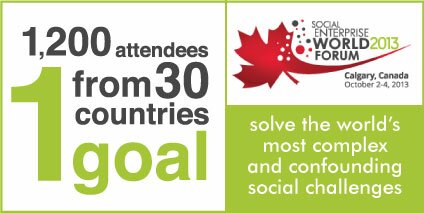Standing with the Poor
By Jacqueline Novogratz
This story originally appeared on Stanford Social Innovation Review's website.
Jacqueline Novogratz is the Founder & CEO of Acumen Fund.
Acumen and SEWF 2103 host, TRICO Charitable Foundation, recently partnered to bring online leadership training to social enterprises in Canada. Click here to learn more.
Batool Hassan, Director of Business Development, Acumen, will be speaking at the SEWF session “Unlikely Alliances”.
Michael Craig, Global Fellow working with BASIX Krishi, Acumen will be speaking at the SEWF session “Rural Revitalization: How Social Enterprise Keeps Rural Communities Viable”.
The feature picture is courtesy of Compfight / A Flickr Search Tool.
Ten years ago, as the Stanford Social Innovation Review was getting off the ground, the idea of impact investing was also beginning to take hold. The early pioneers, including Root Capital, Omidyar Network, and Acumen Fund, set out to make philanthropic capital more productive in serving the poor. We had seen that neither markets nor top-down government nor aid alone solved problems of poverty. We were encouraged by significant investment and collaboration from the philanthropic community, including the Rockefeller Foundation, the Skoll Foundation, and a group of forward-thinking people who saw the potential for impact investing to bring something new to the conversation on social change.
We had no clear roadmap, so we just started and let the work teach us.
A decade later, we’ve learned that patient capital works. Our $80 million in approved investments has created more than 58,000 jobs and affected more than 100 million people. Moreover, more than 200 organizations now work under the impact investing rubric. Some seek high financial returns; others are more focused on social returns. As more funds have been formed, a new sector has emerged. The Aspen Network of Development Entrepreneurs serves as a trade association to professionalize the field and create a forum to share learning. The Global Impact Investment Rating System (GIIRS) provides metrics to compare results between funds. The Impact Reporting and Investing Standards (IRIS) system, managed by the Global Impact Investing Network, is building standards to make those comparisons more relevant. Ultimately, I believe this pioneering work will affect much larger corporations who understand, as we do, that business as usual is not an option.
As impact investing goes mainstream, I have a lot on my mind. For starters, the work of creating new markets in places where markets have failed and aid has fallen short is long, messy, and difficult.
The road to large scale in underserved or nonexistent markets where people earn only a few dollars a day requires not only capital, but also leadership, management support, and strong systems that help support growing companies over time.
All of this takes a sort of hard-edged patience and a gritty determination to do what is right, not what is easy.
As I think about the next ten years, I believe that Acumen and the impact investing sector will need to confront several issues head-on. First, we need to have a more nuanced conversation about the types of capital and technical support needed for different kinds of companies at different stages of their development. My colleagues Sasha Dichter and Rob Katz, along with Monitor Inclusive Markets, wrote about this topic in depth in “Closing the Pioneer Gap,” in the winter 2013 issue of Stanford Social Innovation Review.
Suffice it to say here that more philanthropy and more risk-tolerant capital are needed to help early-stage businesses navigate the challenges of creating markets that serve the poor.
Second, we need to articulate clearly what roles government, civil society, and corporations play in creating ecosystems for social innovations to grow, scale up, and connect to existing markets.
When it comes to solving problems of poverty, impact investing can act as a catalyst, but it is not a silver bullet.
Successful businesses serving the poor need more than investment capital. They also need infrastructure to enable effective distribution, strong regulatory systems, access to markets, technical assistance as they scale up, and more. Government, for example, is critical in creating favorable business conditions. But government can also help companies where the market is less effective, such as those providing goods and services like clean water, sanitation, and preventive health care, grow by providing strategic subsidies. And large corporations can help connect low-income people to reliable supply chains—this also benefits multinational corporations as they seek to expand in emerging markets.
Third, we need to create stronger measures of impact to help the world understand how capital can be used to build the kind of society we want to create. The sector has taken the first steps toward creating better measures through the development of Pulse, GIIRS, and IRIS. As the sector grows and attracts potentially billions of investment dollars in the coming years, we will need even more robust systems to clarify the tradeoffs between financial and social returns.
People interested in impact investing often talk about “doing well by doing good,” the idea that they can generate healthy financial returns while making a positive social impact.
This line of thinking implies that tradeoffs don’t exist, although we’ve learned—often the hard way—that they do, especially when we are dealing with low-income markets in far-flung areas.
We need better metrics to clarify social outcomes and help us understand whether and how our investments are creating more dignity and choice.
Fourth and perhaps most difficult,
we must develop talent and leadership with the moral courage to see the world as it is and with the audacity and skills to imagine and then build it as it could be.
Our portfolio companies constantly cite lack of talent as one of their biggest challenges. Some of our companies are growing from a few dozen on staff to more than a thousand in only a few years. One can imagine the recruiting hurdles, the need for new management systems, and the training that is required to achieve that kind of growth. Indeed, leadership is needed the world over as old systems and ways of doing business prove unable to meet society’s greatest needs.
We are living in a rare moment in history. We have the tools, skills, awareness, and understanding to solve tough global challenges.
Impact investing needs to be part of the solution.
The question is not so much if as how—how we sustain our focus on the moral essence of using investment as a means and not an end, with the goal of building sustainable, scalable systems that provide low-income people with access to choice and real opportunity. For this is where dignity starts, not just for the poor, but for all of us.
More about Acumen:
 Acumen Fund is working to create a world beyond poverty by investing in social enterprises, emerging leaders and breakthrough ideas. We invest patient capital in business models that deliver critical goods and services to the world’s poor, improving the lives of millions. Since 2001, Acumen Fund has globally invested more than $83 million in 70 companies. We are also working to build a global community of emerging leaders that believe in creating a more inclusive world through the tools of both business and philanthropy. Please visit www.acumen.org for more information.
Acumen Fund is working to create a world beyond poverty by investing in social enterprises, emerging leaders and breakthrough ideas. We invest patient capital in business models that deliver critical goods and services to the world’s poor, improving the lives of millions. Since 2001, Acumen Fund has globally invested more than $83 million in 70 companies. We are also working to build a global community of emerging leaders that believe in creating a more inclusive world through the tools of both business and philanthropy. Please visit www.acumen.org for more information.
Tags: Acumen, Impact Investing, Social Finance






